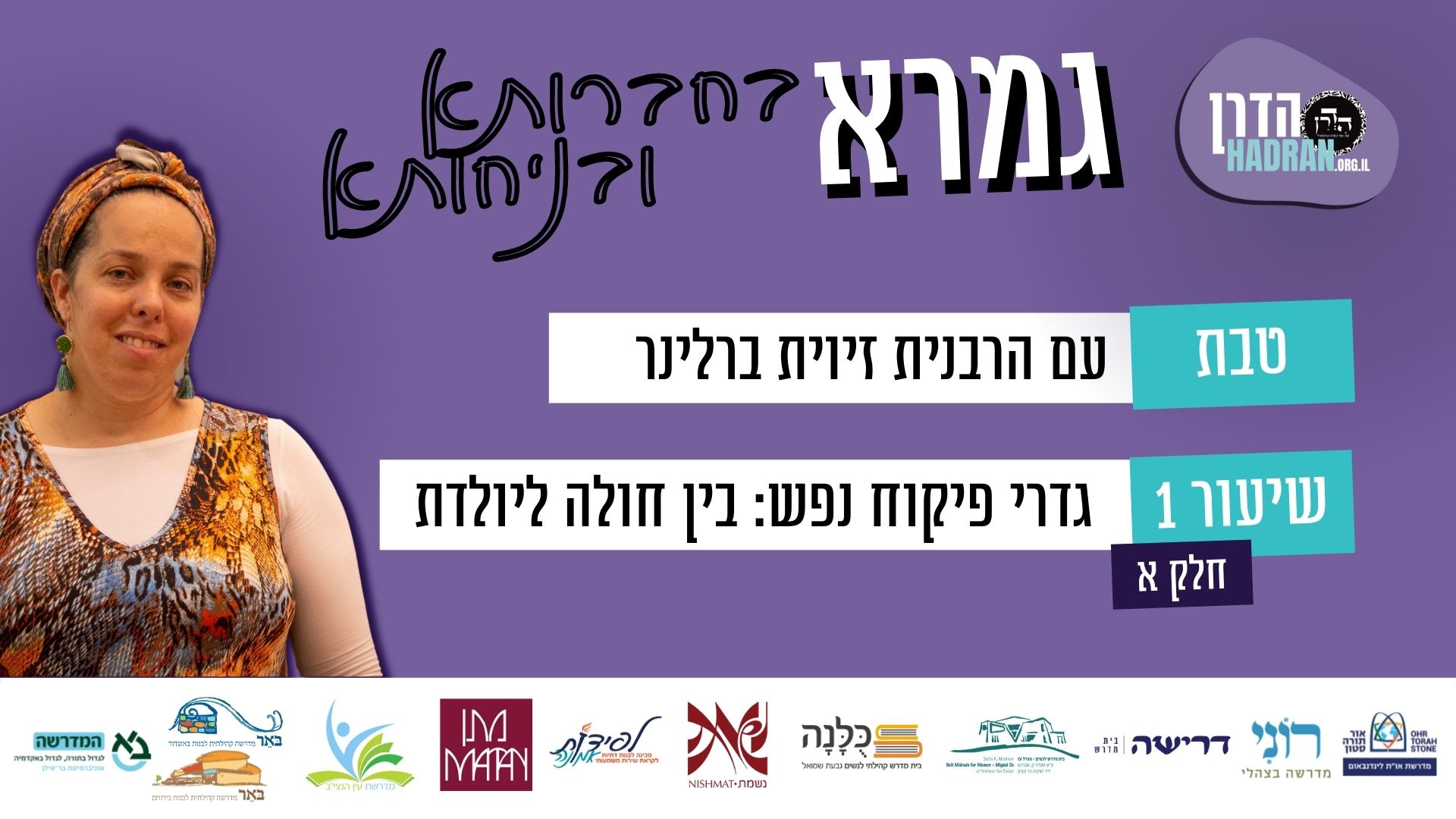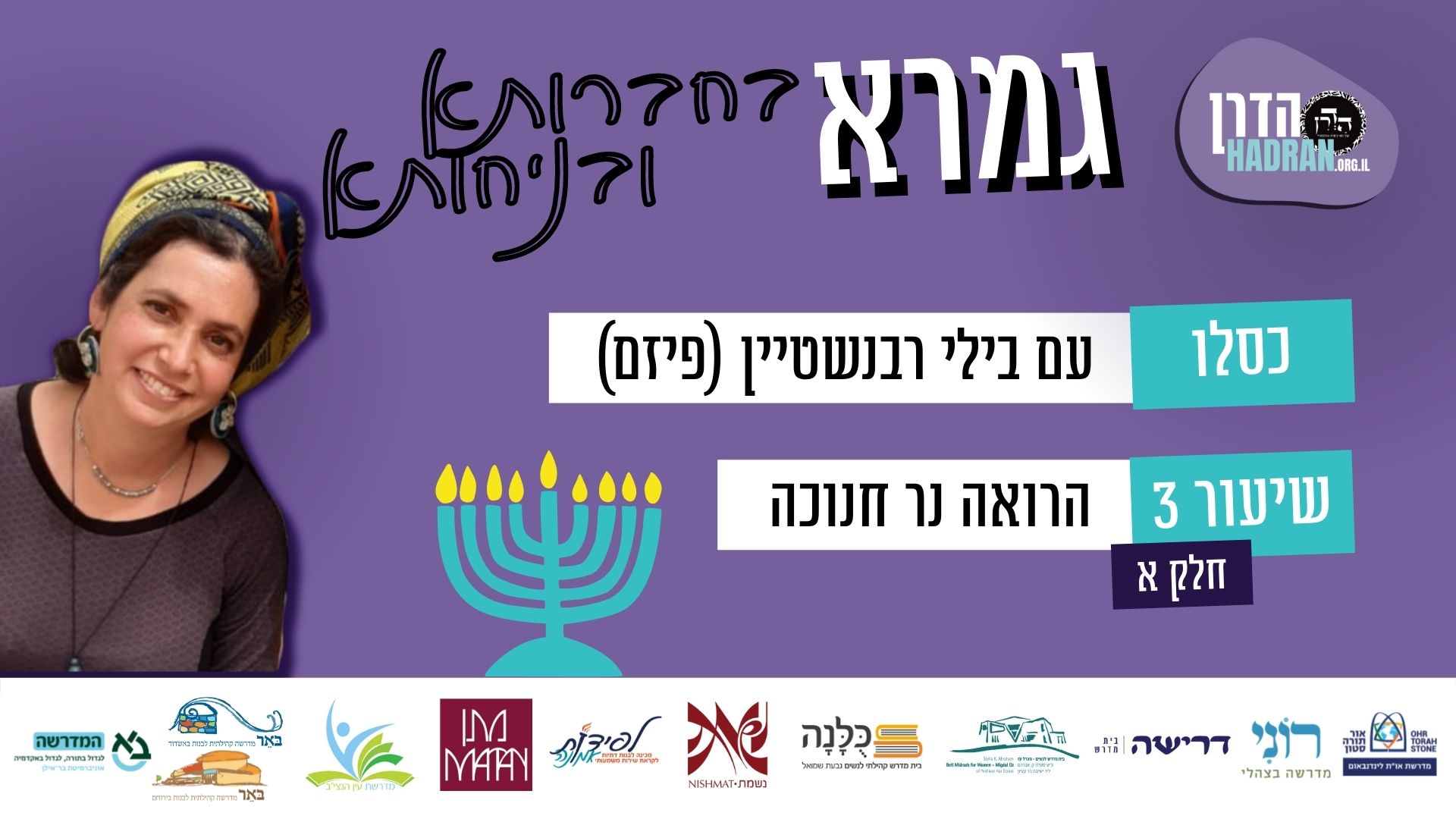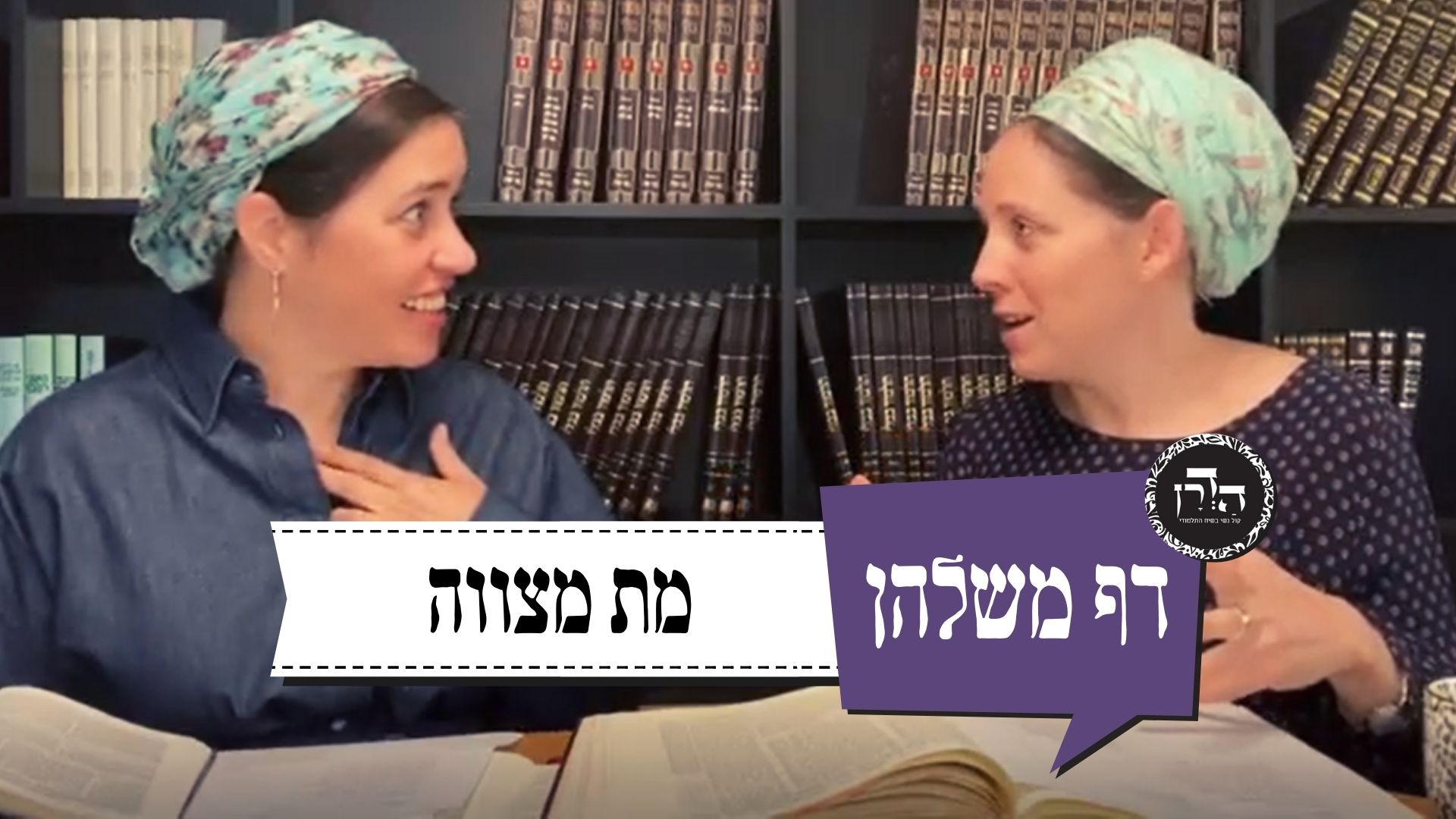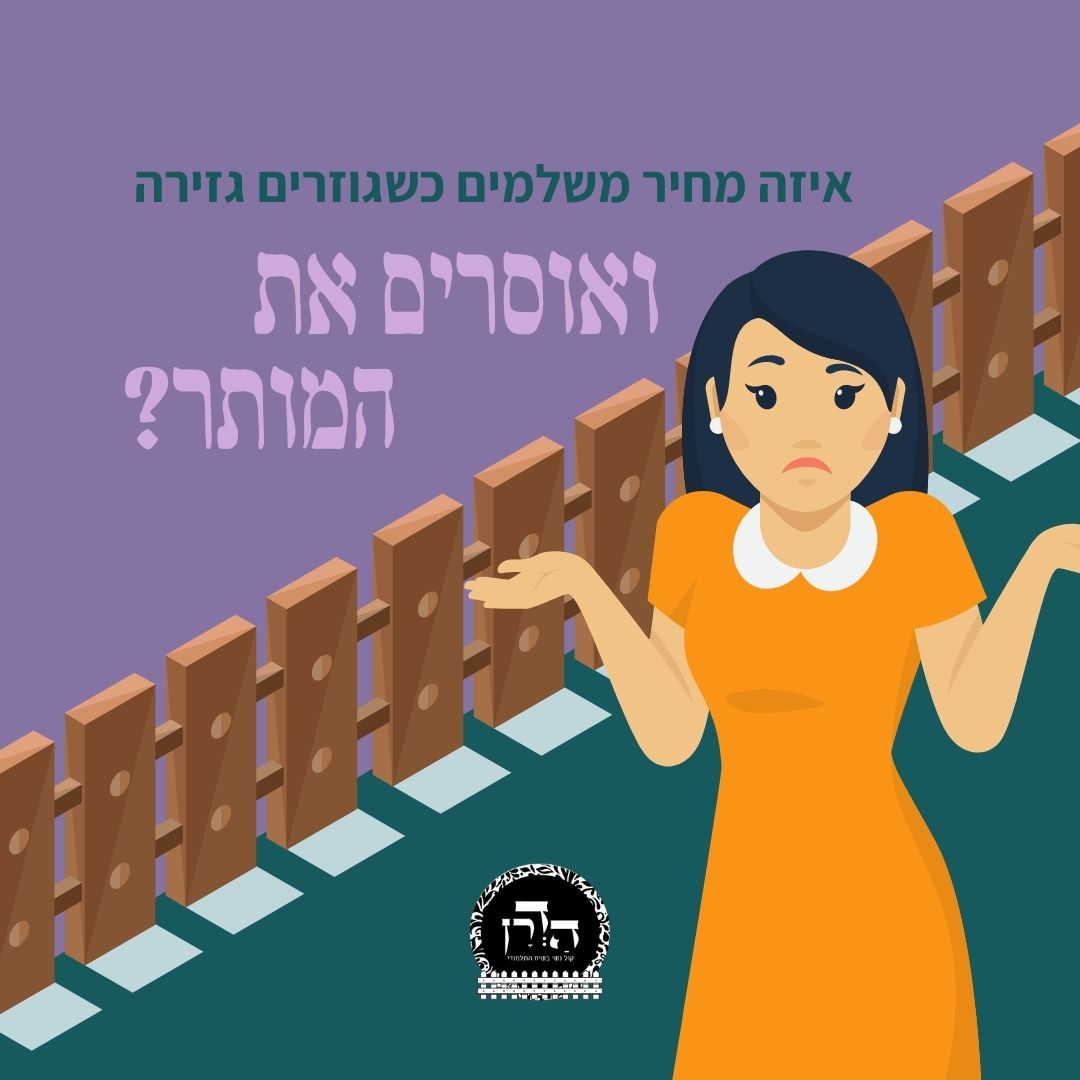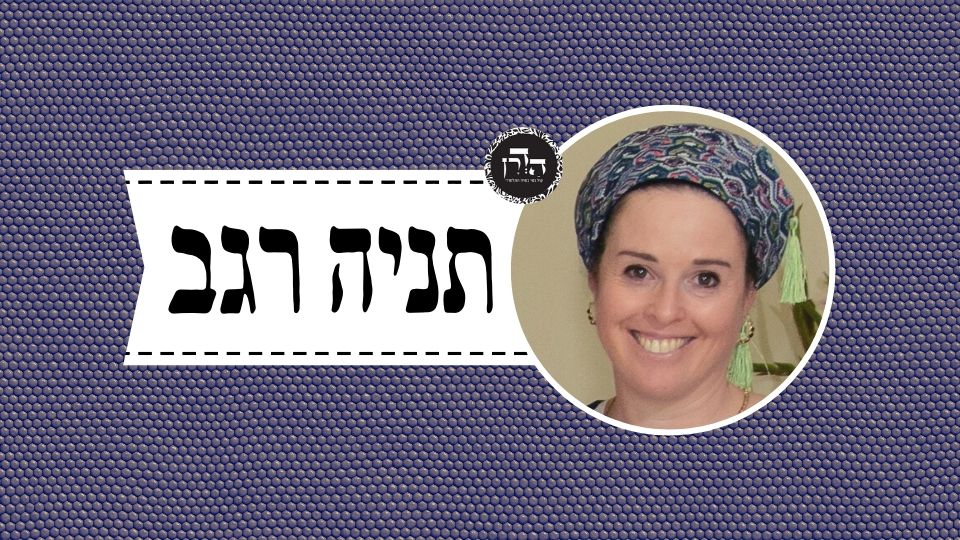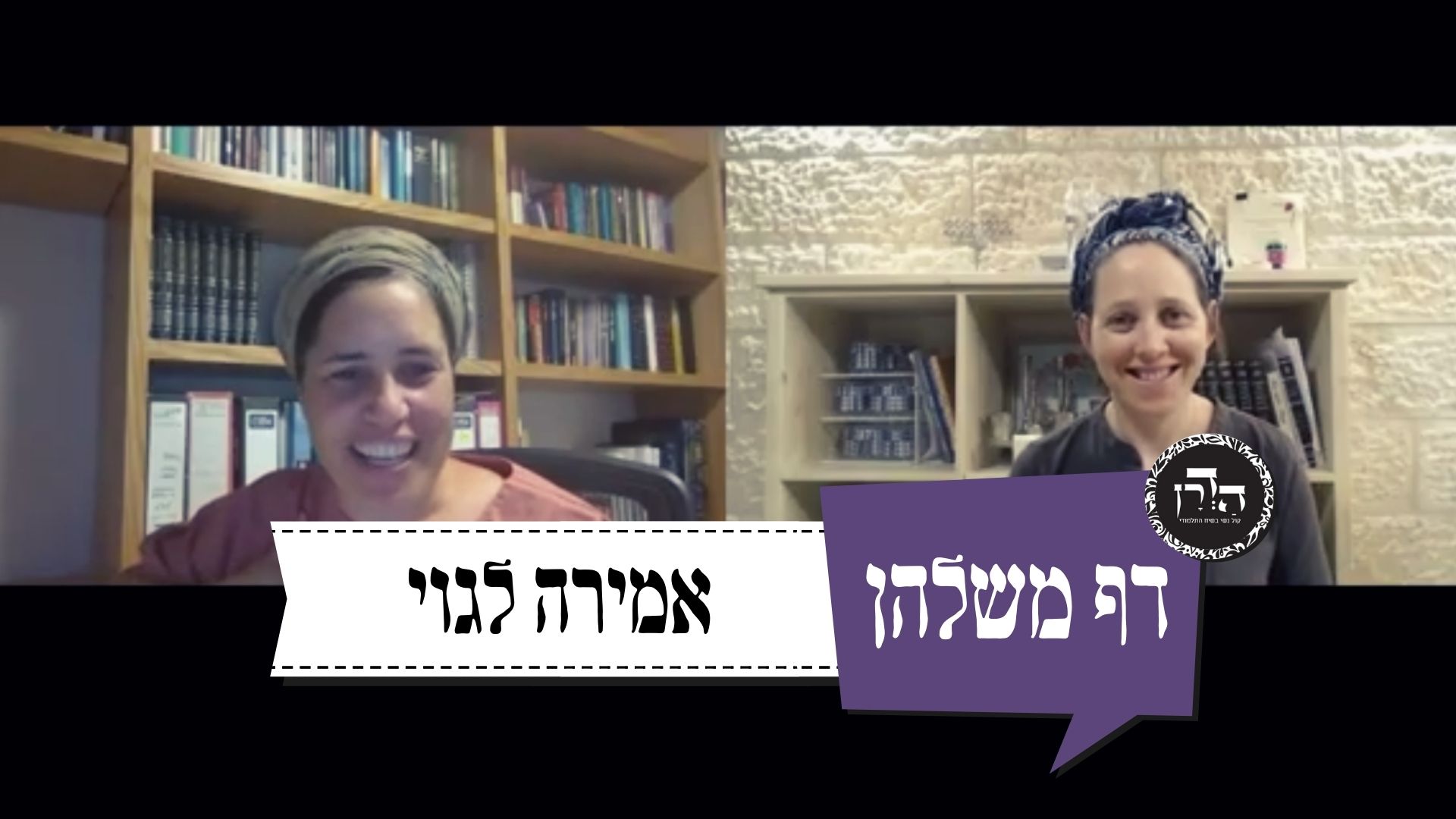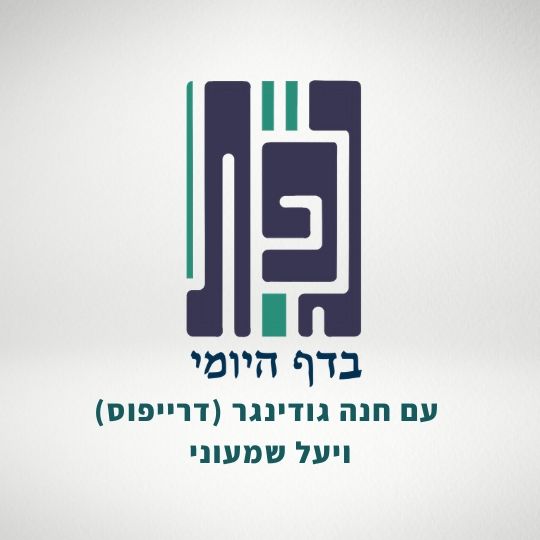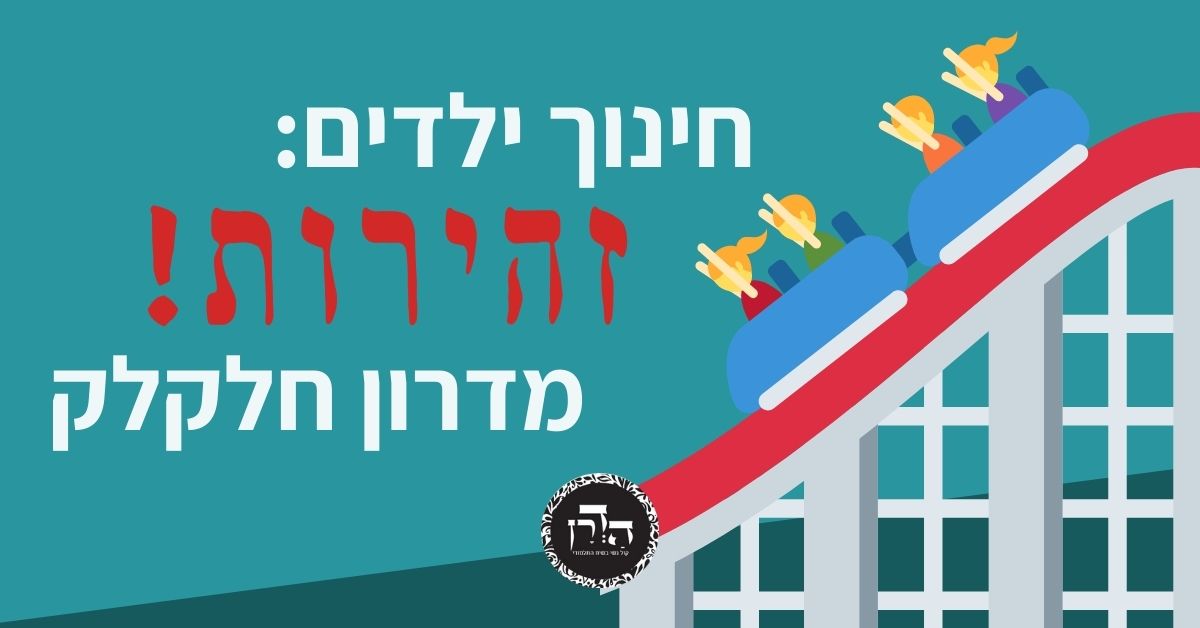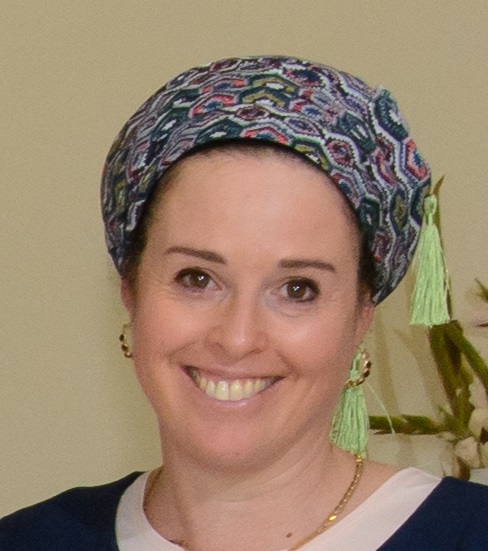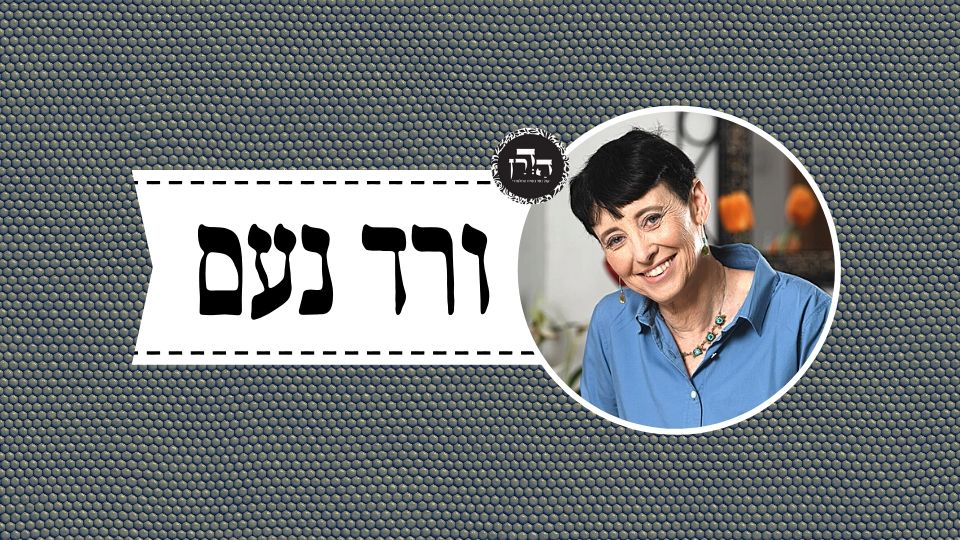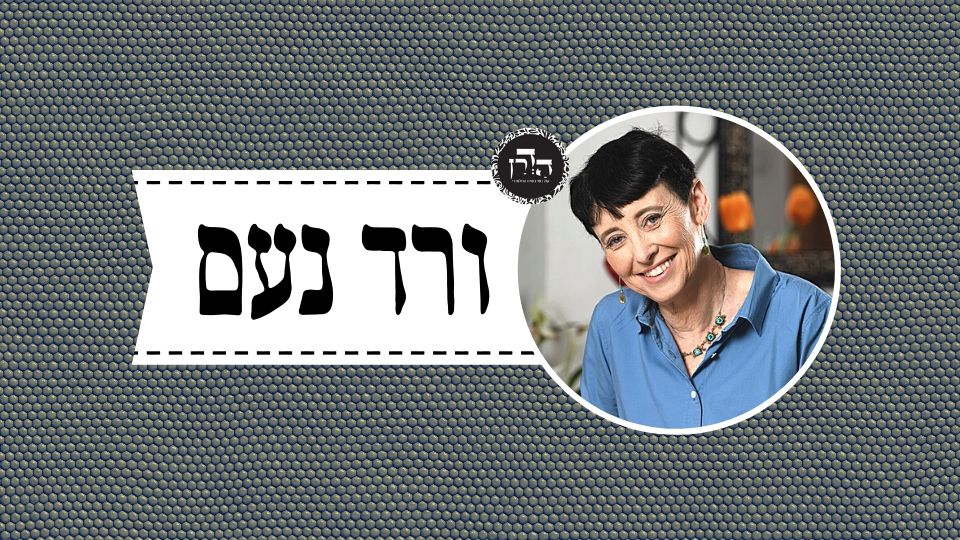שבת קט
לַגִּיגִית — תִּיקָּצֵץ, יָד מְסַמָּא, יָד מַחְרֶשֶׁת, יָד מַעֲלָה פּוֹלִיפּוּס. תַּנְיָא, רַבִּי נָתָן אוֹמֵר: בַּת חוֹרִין הִיא זוֹ וּמַקְפֶּדֶת עַד שֶׁיִּרְחוֹץ יָדָיו שָׁלֹשׁ פְּעָמִים. אָמַר רַבִּי יוֹחָנָן: פּוּךְ מַעֲבִיר בַּת מֶלֶךְ, וּפוֹסֵק אֶת הַדִּמְעָה, וּמַרְבֶּה שֵׂיעָר בָּעַפְעַפַּיִים. תַּנְיָא נָמֵי הָכִי, רַבִּי יוֹסֵי אוֹמֵר: פּוּךְ מַעֲבִיר בַּת מֶלֶךְ, וּפוֹסֵק אֶת הַדִּמְעָה, וּמַרְבֶּה שֵׂיעָר בָּעַפְעַפַּיִם.
that is placed into a barrel of beer should be severed because the beer will not ferment. A hand that frequently touches the eye causes blindness. A hand that frequently touches the ear causes deafness. A hand that touches the nose or mouth causes polyps [polypus]. It was taught in a baraita that Rabbi Natan says: She is a liberated entity, this evil spirit that rests on one’s hands before they are washed in the morning, and she refuses to leave until one washes his hands three times. Rabbi Yoḥanan said: When eye shadow is placed on the eyes it causes the evil spirit called the Daughter of the King to pass, and it stops tears and causes eyelashes to grow. That was also taught in a baraita: Rabbi Yosei says: Eye shadow causes the Daughter of the King to pass, and stops tears and causes eyelashes to grow.
וְאָמַר מָר עוּקְבָא אָמַר שְׁמוּאֵל: עָלִין אֵין בָּהֶם מִשּׁוּם רְפוּאָה. אָמַר רַב יוֹסֵף: כּוּסְבַּרְתָּא אֵין בָּהּ מִשּׁוּם רְפוּאָה. אָמַר רַב שֵׁשֶׁת: כְּשׁוּת אֵין בָּהֶן מִשּׁוּם רְפוּאָה. אָמַר רַב יוֹסֵף: כּוּסְבַּרְתָּא, אֲפִילּוּ לְדִידִי קַשְׁיָא לִי. אָמַר רַב שֵׁשֶׁת: גַּרְגִּירָא, אֲפִילּוּ לְדִידִי מְעַלֵּי [לִי]. וְאָמַר מָר עוּקְבָא אָמַר שְׁמוּאֵל: כׇּל מִינֵי כְּשׁוּת שְׁרוּ לְבַר מִטָּרוֹזָא.
And Mar Ukva said that Shmuel said: Leaves that are placed on the eye (Rabbeinu Ḥananel) contain no element of healing, and therefore one may place them on his eyes on Shabbat.
Rav Yosef said: Coriander contains no element of healing.
Rav Sheshet said: Hops contain no element of healing.
Rav Yosef said: Even for me, who is blind, coriander is harmful. He overstated coriander’s inefficacy, asserting that it is in fact harmful.
Rav Sheshet said: Arugula even for me, despite my blindness, is beneficial.
And Mar Ukva also said that Shmuel said: All types of hops may be eaten on Shabbat except for teruza, which is used exclusively for medicinal purposes.
אָמַר רַב חִסְדָּא: שִׁירְקָא טַוְיָא — שְׁרֵי, פִּיעְפּוּעֵי בֵיעֵי — אָסוּר. דְּבֵיתְהוּ דִּזְעֵירִי עֲבַדָא לֵיהּ לְחִיָּיא בַּר אָשֵׁי, וְלָא אֲכַל. אֲמַרָה לֵיהּ: לְרַבָּךְ עֲבַדִי לֵיהּ וַאֲכַל, וְאַתְּ לָא אָכְלַתְּ?! זְעֵירִי לְטַעְמֵיהּ, דְּאָמַר זְעֵירִי: נוֹתֵן אָדָם יַיִן צָלוּל וּמַיִם צְלוּלִין לְתוֹךְ הַמְשַׁמֶּרֶת בְּשַׁבָּת וְאֵינוֹ חוֹשֵׁשׁ. אַלְמָא כֵּיוָן דְּמִשְׁתְּתֵי הָכִי — לָאו מִידֵּי קָעָבֵיד, הָכָא נָמֵי כֵּיוָן דְּמִיתְּכִיל הָכִי — לָאו מִידֵּי קָעָבֵיד.
Rav Ḥisda said: Melon juice, which is beneficial for the intestines, may be strained and drunk on Shabbat (ge’onim). The juice of pipuim, which are a type of vegetable (Rashba), may not be drunk on Shabbat. The Gemara relates: Ze’iri’s wife made melon juice for Ḥiyya bar Ashi and he did not consume it. She said to him: I made it for your Rabbi, Ze’iri, and he ate it, and you do not eat it? The Gemara explains: Ze’iri followed his own reasoning in permitting this drink, as Ze’iri said: One may place clear wine and clear water into a strainer used to strain dregs from wine on Shabbat without concern. Apparently, since the wine and water are drunk even with what little dregs may remain, one is doing nothing to improve them. Here, too, since melon juice is consumed this way, without being strained and for non-medical purposes, one is doing nothing and it is permitted.
וְאָמַר מָר עוּקְבָא: מִי שֶׁנִּגְּפָה יָדוֹ אוֹ רַגְלוֹ, צוֹמְתָהּ בְּיַיִן וְאֵינוֹ חוֹשֵׁשׁ. אִיבַּעְיָא לְהוּ: חַלָּא מַאי? אָמַר רַב הִלֵּל לְרַב אָשֵׁי: כִּי הֲוֵינָא בֵּי רַב כָּהֲנָא אָמְרִי חַלָּא לָא. אָמַר רָבָא: וְהָנֵי בְּנֵי מָחוֹזָא, כֵּיוָן דִּמְפַנְּקִי — אֲפִילּוּ חַמְרָא נָמֵי מַסֵּי לְהוּ.
And Mar Ukva also said: One whose hand or foot was wounded may immerse it in wine on Shabbat to stop the flow of blood, and he need not be concerned that he is violating the prohibition against healing on Shabbat. A dilemma was raised before the Sages: With regard to vinegar, what is the ruling? May one immerse a wound in it? Rav Hillel said to Rav Ashi: When we were in Rav Kahana’s house they said that vinegar is not permitted, as it is considered actual medicine. Rava said: And these people from Meḥoza, since they are delicate, even wine heals them. Therefore, they may not immerse their wounds in wine.
רָבִינָא אִיקְּלַע לְבֵי רַב אָשֵׁי, חַזְיֵיהּ דִּדְרִיכָא לֵיהּ חֲמָרָא אַגַּבָּא דְכַרְעֵיהּ, וְיָתֵיב קָא צָמֵית לֵיהּ בְּחַלָּא. אֲמַר לֵיהּ: לָא סָבַר לַהּ מָר לְהָא דְּאָמַר רַב הִילֵּל חַלָּא לָא? אֲמַר לֵיהּ: גַּב הַיָּד וְגַב הָרֶגֶל שָׁאנֵי.
The Gemara relates: Ravina happened to come to the house of Rav Ashi. He saw that a donkey stepped on the back of Rav Ashi’s foot, and Rav Ashi sat and immersed his foot in vinegar on Shabbat. Ravina said to Rav Ashi: Does the Master not hold according to that which Rav Hillel stated, that vinegar is not permitted? He said to him: The back of the hand and the back of the foot are different because their wounds are dangerous.
אִיכָּא דְאָמְרִי, חַזְיֵיהּ דְּקָא צָמֵית לֵיהּ בְּחַמְרָא. אֲמַר לֵיהּ: לָא סָבַר לַהּ מָר לְהָא דְּאָמַר רָבָא: הָנֵי בְּנֵי מָחוֹזָא כֵּיוָן דִּמְפַנְּקִי — אֲפִילּוּ חַמְרָא נָמֵי מַסֵּי לְהוּ? וּמָר נָמֵי הָא מְפַנַּק! אֲמַר לֵיהּ: גַּב הַיָּד וְגַב הָרֶגֶל שָׁאנֵי. דְּאָמַר רַב אַדָּא בַּר מַתְנָה אָמַר רַב: גַּב הַיָּד וְגַב הָרֶגֶל הֲרֵי הֵן כְּמַכָּה שֶׁל חָלָל וּמְחַלְּלִין עֲלֵיהֶן אֶת הַשַּׁבָּת.
Some say that Ravina saw that Rav Ashi immersed his foot in wine. Ravina said to him: Does the Master not hold according to that which Rava said: These people from Meḥoza, since they are delicate, even wine heals them? And the Master is also delicate. Rav Ashi said to him: The back of the hand and the back of the foot are different, as Rav Adda bar Mattana said that Rav said: A wound on the back of the hand or the back of the foot is like a fatal wound, and one may desecrate Shabbat for it.
תָּנוּ רַבָּנַן: רוֹחֲצִים בְּמֵי גְרָר, בְּמֵי חַמָּתָן, בְּמֵי עַסְיָא וּבְמֵי טְבֶרְיָא, אֲבָל לֹא בַּיָּם הַגָּדוֹל וְלֹא בְּמֵי מִשְׁרָה וְלֹא בְּיַמָּהּ שֶׁל סְדוֹם.
The Sages taught in a baraita: On Shabbat, one may bathe in the therapeutic hot springs of the waters of Gerar, in the waters of Ḥamatan, in the waters of Asya, and in the waters of Tiberias; however, one may not bathe in the Great Sea, namely, the Mediterranean sea, nor in water in which flax was soaked, nor in the Sea of Sodom, because people bathe in those bodies of water only for medicinal purposes.
וּרְמִינְהוּ: רוֹחֲצִים בְּמֵי טְבֶרְיָא וּבַיָּם הַגָּדוֹל, אֲבָל לֹא בְּמֵי מִשְׁרָה וְלֹא בְּיַמָּהּ שֶׁל סְדוֹם — קַשְׁיָא יָם הַגָּדוֹל אַיָּם הַגָּדוֹל!
And the Gemara raises a contradiction based on that which was taught in another baraita: One may bathe in the waters of Tiberias on Shabbat and in the Great Sea; but one may not bathe in water in which flax was soaked, nor in the Sea of Sodom. This is difficult because in the first baraita the Sages prohibit bathing in the Great Sea, and in this baraita they permit bathing in the Great Sea.
אָמַר רַבִּי יוֹחָנָן, לָא קַשְׁיָא: הָא — רַבִּי מֵאִיר, הָא — רַבִּי יְהוּדָה. דִּתְנַן: כָּל הַיַּמִּים כְּמִקְוֶה, שֶׁנֶּאֱמַר: ״וּלְמִקְוֵה הַמַּיִם קָרָא יַמִּים״, דִּבְרֵי רַבִּי מֵאִיר. רַבִּי יְהוּדָה אוֹמֵר: יָם הַגָּדוֹל כְּמִקְוֶה, וְלֹא נֶאֱמַר ״יַמִּים״, אֶלָּא שֶׁיֵּשׁ בּוֹ מִינֵי יַמִּים הַרְבֵּה.
Rabbi Yoḥanan said: This is not difficult, because this baraita, which permits bathing in the Great Sea, is in accordance with the opinion of Rabbi Meir, who deems all seas equal. That baraita, which prohibits bathing there, is in accordance with the opinion of Rabbi Yehuda, who holds that the Great Sea is unlike other seas. As we learned in a mishna: All seas purify like a ritual bath [mikve], as it is stated: “And God called the dry land earth, and the gathering together of the waters [mikve] He called seas” (Genesis 1:10); this is the statement of Rabbi Meir. Rabbi Yehuda says: Only the Great Sea purifies like a ritual bath, and the verse states seas only because there are many seas in the Great Sea, not because all seas purify.
רַבִּי יוֹסֵי אוֹמֵר: כׇּל הַיַּמִּים מְטַהֲרִין בְּזוֹחֲלִין, וּפְסוּלִים לְזָבִים וְלִמְצוֹרָעִים וּלְקַדֵּשׁ בָּהֶן מֵי חַטָּאת. מַתְקֵיף לַהּ רַב נַחְמָן בַּר יִצְחָק:
Rabbi Yosei says: All seas purify like a ritual bath. They actually purify even more than a ritual bath, as they purify even when they are flowing. Immersion in a sea is purifying not only when its waters are still, but even when they are flowing. That is not the case with a ritual bath, whose waters only purify when still. And sea water is invalid for purifying zavim and lepers and for sanctifying purification water to mix the ashes of the red heifer with it. Those cases require spring water. Rav Naḥman bar Yitzḥak strongly objects to this explanation:
אֵימוֹר דִּפְלִיגִי לְעִנְיַן טוּמְאָה וְטׇהֳרָה, לְעִנְיַן שַׁבָּת מִי שָׁמְעַתְּ לְהוּ? אֶלָּא אָמַר רַב נַחְמָן בַּר יִצְחָק, לָא קַשְׁיָא: הָא דְּאִישְׁתַּהִי, הָא דְּלָא אִישְׁתַּהִי.
Say that they disagree over the status of the Mediterranean Sea with regard to impurity and purity, but with regard to Shabbat did you hear that they disagree? Rather, Rav Naḥman bar Yitzḥak said: The contradiction between the two baraitot is not difficult. This baraita, which prohibits bathing in the Mediterranean, is referring to a case where one remained in the water and thereby indicated that he bathed in the Mediterranean for its curative effects. That baraita, which permits bathing, is referring to a case where one did not remain in the water, and thereby indicated that he bathed in the Mediterranean for non-medical purposes.
בְּמַאי אוֹקֵימְתָּא לְבָתְרָיְיתָא — דְּלָא אִישְׁתַּהִי, אִי דְּלָא אִישְׁתַּהִי — אֲפִילּוּ בְּמֵי מִשְׁרָה נָמֵי. דְּהָתַנְיָא: רוֹחֲצִין בְּמֵי טְבֶרְיָא וּבְמֵי מִשְׁרָה וּבְיַמָּה שֶׁל סְדוֹם, וְאַף עַל פִּי שֶׁיֵּשׁ לוֹ חֲטָטִים בְּרֹאשׁוֹ. בַּמֶּה דְּבָרִים אֲמוּרִים — שֶׁלֹּא נִשְׁתַּהָא, אֲבָל נִשְׁתַּהָא — אָסוּר.
The Gemara asks: And how did you establish this last baraita? Do you say that it is referring to a case where one did not remain in the water? If it is referring to a case where one did not remain in the water, it would be permitted to bathe even in water in which flax was soaked, as it was taught in a baraita: One may bathe on Shabbat in the waters of Tiberias, and in water in which flax was soaked, and in the Sodom Sea, and this is even though one has wounds on his head that are healed by bathing in these waters. In what case is this statement said? In a case where one did not remain in the water, since it appears that he entered the water to cool himself. However, if one remained in the water it is prohibited.
אֶלָּא יָם הַגָּדוֹל אַיָּם הַגָּדוֹל לָא קַשְׁיָא: הָא — בְּיָפִין שֶׁבּוֹ, הָא — בְּרָעִים שֶׁבּוֹ. מֵי מִשְׁרָה אַמֵּי מִשְׁרָה נָמֵי לָא קַשְׁיָא: הָא — דְּאִישְׁתַּהִי, הָא — דְּלָא אִישְׁתַּהִי.
Rather, the contradiction between the baraita that permits bathing in the Great Sea on Shabbat and the baraita that prohibits bathing in the Great Sea on Shabbat is not difficult. There is a distinction between the two. This baraita, which permits doing so, is referring to the pure water in it, i.e., the area in the Great Sea in which one bathes for pleasure during the week. That baraita, which prohibits bathing, is referring to the polluted water in it, which people enter only for medicinal purposes. And with regard to the contradiction between one statement with regard to the water in which flax was soaked and the other statement about water in which flax was soaked, it is also not difficult. There is a distinction between the two statements. This baraita, which prohibits bathing on Shabbat in water in which flax was soaked, is referring to a case where one remained in the water and thereby indicated that he was bathing for medicinal purposes. That baraita, which permits bathing on Shabbat in water in which flax was soaked, is referring to a case where one did not remain there. It is permitted to bathe in that water for non-medical purposes.
מַתְנִי׳ אֵין אוֹכְלִין אֵיזֹבְיוֹן בְּשַׁבָּת לְפִי שֶׁאֵינוֹ מַאֲכַל בְּרִיאִים, אֲבָל אוֹכֵל הוּא אֶת יוֹעֶזֶר, וְשׁוֹתֶה אַבּוּבְרוֹאֶה. כׇּל הָאוֹכָלִין — אוֹכֵל אָדָם לִרְפוּאָה, וְכׇל הַמַּשְׁקִין — שׁוֹתֶה, חוּץ מִמֵּי דְקָלִים וְכוֹס עִיקָּרִין, מִפְּנֵי שֶׁהֵן לִירוֹקָה. אֲבָל שׁוֹתֶה הוּא מֵי דְקָלִים לִצְמָאוֹ, וְסָךְ שֶׁמֶן עִיקָּרִין שֶׁלֹּא לִרְפוּאָה.
MISHNA: One may not eat eizoveyon on Shabbat because healthy people do not eat it, and therefore it is clear that anyone eating it is doing so for its medicinal value. However, one may eat a plant called yo’ezer and may drink abuvro’e. Furthermore, all types of food that healthy people eat may be eaten by a person even for medicinal purposes. And one may drink all drinks except for water from palm trees and a kos ikarin because they are known as a remedy for jaundice. Therefore, it is prohibited to drink them on Shabbat for curative purposes. However, one may drink palm tree water on Shabbat in order to quench his thirst, and one may smear ikarin oil on himself for non-medical purposes.
גְּמָ׳ אָמַר רַב יוֹסֵף: אֵזוֹב — ״אַבְרָתָה בַּר הֲמַג״, אֵיזֹבְיוֹן — ״אַבְרָתָה בַּר הִינְג״. עוּלָּא אָמַר: מָרְוָא חִיוָּרָא. עוּלָּא אִיקְּלַע לְבֵי רַב שְׁמוּאֵל בַּר יְהוּדָה, אַיְיתוֹ לְקַמֵּיהּ מָרְוָא חִיוָּרָא. אֲמַר: הַיְינוּ אֵזוֹב דִּכְתִיב בְּאוֹרָיְיתָא. רַב פַּפֵּי אָמַר: שׁוּמְשׁוּק. אָמַר רַב יִרְמְיָה מִדִּיפְתִּי: כְּווֹתֵיהּ דְּרַב פַּפֵּי מִסְתַּבְּרָא, דִּתְנַן: מִצְוַת אֵזוֹב שְׁלֹשָׁה קְלָחִין וּבָהֶן שְׁלֹשָׁה גִבְעוֹלִין, וְשׁוּמְשׁוּק הוּא דְּמִשְׁתַּכְחָא הָכִי. לְמַאי אָכְלִי לֵיהּ — לְקוּקְאיָנֵי. בְּמַאי אָכְלִי לֵיהּ — בִּשְׁבַע תַּמְרֵי אוּכָּמָתָא. מִמַּאי הָוְיָא — מִקִּימְחָא דִשְׂעָרֵי בְּמָנָא דַּחֲלֵיף עֲלֵיהּ אַרְבְּעִין יוֹמִין.
GEMARA: Rav Yosef said: Unspecified hyssop mentioned in the Torah is called abarta bar hamag in Babylonia, and eizoveyon is called abarta bar hing. Ulla said: The hyssop mentioned in the Torah is white sage. The Gemara relates: Ulla happened to come to the house of Rav Shmuel bar Yehuda. They brought white sage before him. He said: This is the hyssop that is written in the Torah. Rav Pappi said: Hyssop is the root called shumeshuk. Rav Yirmeya of Difti said: In accordance with the opinion of Rav Pappi it is reasonable, as we learned in a mishna: The mitzva of hyssop is that one take three branches each with three stems, and shumeshuk is the species that is found with that configuration of three stems on each of its branches. The Gemara says: For what purpose do people eat it? It is eaten for curing intestinal worms. And with what is it eaten? It is eaten with seven black dates. From what do worms come into being in the intestines? They come into being from eating barley flour from a vessel that held the flour for forty days since it was ground.
אֲבָל אוֹכֵל הוּא אֶת יוֹעֶזֶר. מַאי יוֹעֶזֶר? פּוּתַּנְק. לְמַאי אָכְלִי לַהּ — לְאַרְקָתָא. בְּמַאי אָכְלִי לַהּ — בִּשְׁבַע תַּמְרֵי חִיוּוֹרָתָא. מִמַּאי הָוְיָא — מֵאוּמְצָא וּמַיָּא אַלִּיבָּא רֵיקָנָא, וּמִבִּישְׂרָא שַׁמִּינָא אַלִּיבָּא רֵיקָנָא, וּמִבִּישְׂרָא דְתוֹרָא אַלִּיבָּא רֵיקָנָא, מֵאַמְגּוּזָא אַלִּיבָּא רֵיקָנָא, וּמִגִּירֵי דְרוּבְיָא אַלִּיבָּא רֵיקָנָא וּמִשְׁתֵּי מַיָּא אַבָּתְרֵיהּ.
We learned in the mishna: However, one may eat the yo’ezer plant. The Gemara asks: What is yo’ezer? The Gemara answers: It is the vegetable known as potnak. For what is it eaten? It is eaten to cure liver worms. With what is it eaten? It is eaten with seven white dates. From what do worms come into being in the liver? From eating raw meat with water on an empty stomach, and from eating fatty meat on an empty stomach, and from eating ox meat on an empty stomach, and from eating nuts on an empty stomach, and from eating fenugreek shoots on an empty stomach and drinking water thereafter.
וְאִי לָא — לִיבְלַע תַּחְלֵי חִיוּוֹרָתָא. וְאִי לָא — לִיתִּיב בְּתַעֲנִיתָא, וְלַיְתֵי בִּישְׂרָא שַׁמִּינָא וְלִישְׁדֵּי אַגּוּמְרֵי, וְלִימֵיץ גַּרְמָא, וְלִיגַמַּע חַלָּא. וְאִיכָּא דְאָמְרִי: חַלָּא לָא, מִשּׁוּם דְּקָשֵׁי לְכַבְדָּא. וְאִי לָא — לַיְיתֵי גִּירְדָּא דַאֲסִינְתָּא דִּגְרִידָא מֵעִילַּאי לְתַתַּאי, וְלָא מִתַּתַּאי לְעִילַּאי, דִּילְמָא נָפְקָא אַיְּידֵי פּוּמֵּיהּ, וְלִישְׁלְקַהּ בְּשִׁיכְרָא בֵּי שִׁיבָבֵי, וּלְמָחָר נִסְכְּרִינּוּן לְנִקְבִין דִּידֵיהּ וְלִישְׁתֵּי, וְכִי מִפְּנֵי — מִפְּנֵי אַפְּשִׁיחָא דְּדִקְלָא.
And if one has liver worms but does not have any potnak handy, or if one has taken potnak and it did not help, he should swallow white cress. And if he does not have that or if it did not help him, he should sit in fast, and take fatty meat and place it on coals and suck the bone and swallow vinegar. And some say: One should not drink vinegar because it is harmful to the liver. And if none of those options are available, let one take the sawdust that was scraped from the shell of a thorn bush from top to bottom, and not from bottom to top, as perhaps then the worms will come out through his mouth. And let one then boil the scrapings in beer at twilight and the next day close his nostrils and drink it. And when he defecates, he should defecate on the trunk of a palm tree.
וְשׁוֹתִין אַבּוּבְרוֹאֶה. מַאי אַבּוּבְרוֹאֶה? חוּמַטְרִיָּא. מַאי חוּמַטְרִיָּא? חוּטְרָא יְחִידָאָה. לְמַאי עָבְדִי לַהּ — לְגִילּוּיָא. וְאִי לָא — לַיְתֵי חַמְשָׁא כְּלִילֵי וְחַמְשָׁא כּוֹסָתָא דְשִׁיכְרָא, וְנִישְׁלוֹקִינְהוּ בַּהֲדֵי הֲדָדֵי עַד דְּקַיְימָא אַאַנְפָּקָא, וְנִישְׁתֵּי.
We learned the mishna: And one may drink abuvro’e on Shabbat. The Gemara asks: What is abuvro’e? The Gemara answers: It is the plant known as ḥumtareya. The Gemara asks: What is ḥumtareya? It is that which is called the lonely staff. The Gemara asks: For what purpose is it used? It is used for one who drank exposed water from which we suspect a snake drank and left behind its venom. And if one does not have the lonely staff, or if it was ineffective, let him take five roses and five cups of beer and cook them together until there is a quarter of a log of liquid and then drink it.
אִימֵּיהּ דְּרַב אַחָדְבוּי בַּר אַמֵּי עֲבַדָה לֵיהּ לְהָהוּא גַּבְרָא חַד כְּלִילָא וְחַד כּוֹסְתָּא דְשִׁיכְרָא. שְׁלַקָה וְאַישְׁקִיתֵיהּ, וּשְׁגַרָא תַּנּוּרָא וּגְרַפְתֵּיהּ, (ואותביתיה לבינתא) [וְאוֹתִיבָה בֵּיהּ לְבֵינְתָּא, וְאוֹתִיבְתֵּיהּ] בְּגַוֵּויהּ, וּנְפַק [מִינֵּיהּ] כְּהוּצָא יַרְקָא.
The Gemara relates: Rav Aḥadvoi bar Ami’s mother made this remedy for a certain man who had drunk exposed water suspected of having venom in it. She took one rose and one cup of beer and she boiled them. She gave it to him to drink, and lit the oven, and swept out the coals, and placed a brick inside it on which he could sit and not get burned. And something that appeared like a green leaf emerged, i.e., he vomited the venom.
רַב אַוְיָא אָמַר: רְבִיעֵתָא דַחֲלָבָא מֵעִיזָּא חִיוָּרְתָּא. רַב הוּנָא בַּר יְהוּדָה אָמַר: לַיְיתֵי אֶתְרוֹגָא חֲלִיתָא וְלִחַיְּיקֵיהּ וְלִימַלְּיֵיהּ דּוּבְשָׁא, וְלוֹתְבֵהּ בֵּי מִילְלֵי דְנוּרָא, וְלֵיכְלֵיהּ. רַבִּי חֲנִינָא אָמַר, מֵי רַגְלַיִם בְּנֵי אַרְבָּעִים יוֹם: בַּרְזִינָא — לְזִיבּוּרָא, רְבִיעֵתָא — לְעַקְרַבָּא, פַּלְגָא רִיבְעָא — לְגִילּוּיָא, רִיבְעָא — אֲפִילּוּ לִכְשָׁפִים מְעַלּוּ. אָמַר רַבִּי יוֹחָנָן: אֲנִיגְרוֹן, וַאֲבַנְגַּר, וְתִירְיָיקָה — מְעַלּוּ בֵּין לְגִילּוּיָא בֵּין לִכְשָׁפִים.
Rav Avya said: The remedy for one who has swallowed venom is to drink a quarter of a log of milk from a white goat. Rav Huna bar Yehuda said: Let one bring a sweet citron and make a hole in it, and fill it with honey, and place it among burning coals, and eat it. Rabbi Ḥanina said: Urine that is forty days old is an effective remedy for several maladies: A very small cupful is beneficial in treating a hornet sting. A quarter of a log is beneficial in treating a scorpion bite. Half a log is effective in treating one who drank exposed water. A log is even effective in counteracting witchcraft. Rabbi Yoḥanan said: Water in which spinach was boiled [anigron], and water in which banagri grass was boiled [avangar], and balsam are effective for both one who drank exposed water and as an antidote for witchcraft.
הַאי מַאן דִּבְלַע חִיוְיָא — לוֹכְלֵיהּ כְּשׁוּתָא בְּמִילְחָא, וְלַירְהֲטֵיהּ תְּלָתָא מִילֵּי. רַב שִׁימִי בַּר אָשֵׁי חַזְיֵיהּ לְהָהוּא גַּבְרָא דִּבְלַע חִיוְיָא. אִידְּמִי לֵיהּ כְּפַרָּשָׁא. אוֹכְלֵיהּ כְּשׁוּתָא בְּמִילְחָא וְאַרְהֲטֵיהּ קַמֵּיהּ תְּלָתָא מִילֵּי, וּנְפַק מִינֵּיהּ גּוּבֵּי גּוּבֵּי. אִיכָּא דְאָמְרִי: רַב שִׁימִי בַּר אָשֵׁי בְּלַע חִיוְיָא, אֲתָא אֵלִיָּהוּ אִידְּמִי לֵיהּ כְּפַרָּשָׁא. אוֹכְלֵיהּ כְּשׁוּתָא בְּמִילְחָא וְאַרְהֲטֵיהּ קַמֵּיהּ תְּלָתָא מִילֵּי וּנְפַק מִינֵּיהּ גּוּבֵּי גּוּבֵּי. הַאי מַאן דְּטַרְקֵיהּ חִיוְיָא — לֵיתֵי עוּבָּרָא דַחֲמָרָא חִיוָּרְתִּי, וְלִיקְרְעֵיהּ, וְלוֹתְבֵיהּ עִילָּוֵיהּ. וְהָנֵי מִילֵּי דְּלָא אִישְׁתְּכַח טְרֵפָה. הָהוּא
One who swallowed a snake should be fed hops in salt, and then he should be made to run a distance of three mil. The Gemara relates: Rav Shimi bar Ashi saw a person who swallowed a snake, and Rav Ashi appeared to that person as a horseman. Rav Shimi fed him hops with salt and made him run in front of him for three mil, and the snake came out of him in pieces. Some say that Rav Shimi bar Ashi was the one who swallowed a snake, and Elijah came and appeared to Rav Ashi as a horseman. He fed him hops with salt and made him run in front of him for three mil, and the snake came out of him in pieces. One who was bitten by a snake should have the fetus of a white donkey brought to him, and it should be torn open and placed on the snakebite. The Gemara says: And this applies only when the mother does not have a condition that will cause it to die within twelve months [tereifa]. The Gemara relates: There was a certain



